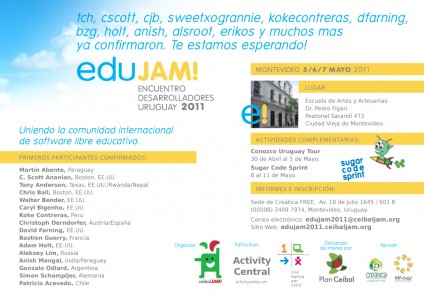
Monthly Archives: May 2011
How to use a stylus with your XO
A team sponsored by Uruguay’s Universidad de la Republica has developed a simple electronics kit that can be used to modify an XO-1 to let you draw on its screen with a wireless stylus and a thin acrylic sheet, turning it into a touchscreen. Â Christoph has written more about this and their related robotics work.
The methodology described in their project poster is brief and tantalizing – it looks like a most promising idea. The invention can in theory work with any screen or computer, but here they are showing how it works with an XO. Here is a closeup of a Lapix set in action:
Check out the photo and transcription of the project poster after the jump.
Continue reading
Comments on Jeffrey James’s olpc critique
By Antonio M. Battro, OLPC’s Chief Education Officer
Jeffrey James wrote a critique of OLPC last year, proposing a balanced pattern of “sharing computers” among children (say 5 children per computer, in the US or the UK) instead of the olpc “one to one” model – one laptop per child (and per teacher). As an alternative to olpc, James proposes that “the number of students per laptop stands in roughly the same ratio as the difference in per capita incomes between the rich and the poor country” (p. 385). In his view, the OLPC idea to persuade the developing countries to exceed the standards of shared computers of developed countries seems “utterly perverse” (p. 386).
It seems that his reasoning will fail if we substitute mobile phones for laptops. We don’t frequently share mobile phones, and in many poor countries their number exceeds James’s predictions about ratios of income and information and communication technologies in the hands of people. It seems difficult to accept the universality of his model about “sharingâ€, because laptops, tablets and mobile phones are rapidly converging in new hybrids.
On the other side, his ideas for successful low-cost technology sharing are not clear. One of his options, for instance, is “to purchase Intel’s Classmate computer at a similarly low price and let [them] be shared by as many students as is thought desirable†(p.389). In Argentina, where the Classmate has been most widely adopted, the national government is deploying some 3 million Classmates to cover the whole population of students and teachers of the secondary public schools in the country, on a one to one basis – an idea first proposed by OLPC some 5 years ago. It would be interesting to know the current state of affairs of other options he references (Simputer, NComputing, sharing multiple mice). However the quoted references are from 2006 and 2008, and 3-5 years is a long time in the digital era.
From the point of view of psychology and education, some comments about “teaching†need careful revision. First, in his paper James never speaks of the need to give laptops to the teachers, despite the significant mass of teachers in the world. On the contrary, OLPC programs start in every country by giving a laptop per teacher and providing corresponding teacher training. We know that a) “digital skills†develop in stages from the very early ages, as a second language (Battro & Denham, 2007) and b) most teachers didn’t have the opportunity to early access to this new global environment in the poor and developing countries.
butiábot: XO Linerider robot in action
Team BUTIÃ from Uruguay has been working on an XO robotics project for over a year. They showed off their line-following XO-robot, butiabot, in Montevideo this weekend. An XO running TurtleArt code hooked up to a mobile robotic platform followed a dark line along the ground.

They have posted some details of their prototypes online.
This reminds me of the XO hack to control a Roomba over the Net, but cooler, with Turtle Art and a realtime-hackable control program.
eduJAM! starts in Uruguay
The eduJAM! convocation is going strong, with 2-3 days of Sugar camp and discussion among developers and teachers from across the world. Keep an eye on the ceibalJAM site in the coming days for videos and notes from the event.
You can browse some of the presentations on the edujam2011 slideshare account.
Why laptops? Advice for parents from New Zealand
Rob McCrae, ICT Director for Auckland’s Diocesan School for Girls, shares a conversation he had with parents at his school about why laptops are a fundamental platform for children learning. Via Scott McLeod.
What has become important is the “just in time†model. A model which sees essential habits and attitudes of learning being the focus. A model which sees the ability to think about our own thinking as a focus.
And expect to see traditionally-held beliefs challenged. Here is a model of the human brain showing the areas that are being engaged as the same person (an experienced Web surfer) reads a book and, at a separate time, is browsing the Web…




